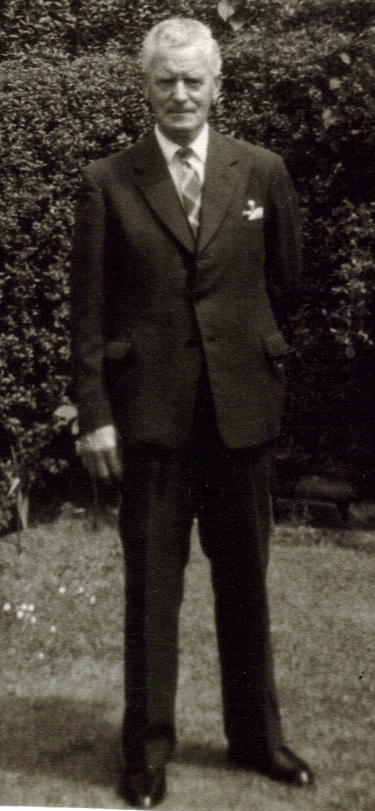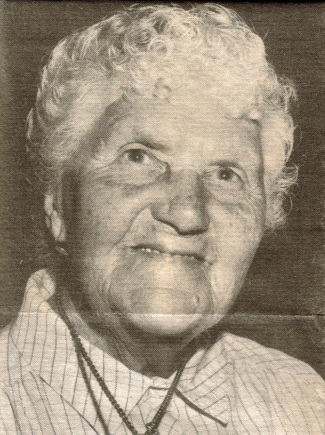Cardinal Robert Sarah Appointed Prefect of the Congregation for Divine Worship and the Discipline of the Sacraments
 Torch of The Faith News on Monday 24 November 2014 - 16:29:15 | by admin
Torch of The Faith News on Monday 24 November 2014 - 16:29:15 | by admin
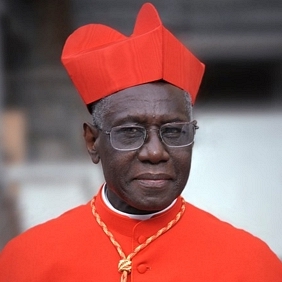
Cardinal Robert Sarah from Guinea has been appointed by Pope Francis as the new Prefect of the Congregation for Divine Worship and the Discipline of the Sacraments.
The appointment of His Eminence is heartening because Vatican observers suggest that he has a traditional approach to the Sacred Liturgy. He has also encouraged many Catholics because of his consistently strong defence of the true teachings and practice of the Catholic Church in the fields of evangelization, charitable outreach and sexual morality.
During the turmoil surrounding the mid-term Relatio document at the recent Synod on the Family, Cardinal Sarah affirmed that, whilst the Church does not judge people who suffer with same-sex attraction, 'homosexual behaviour and homosexual unions are grave deviations of sexuality.' He explained: 'Based on the Sacred Scriptures, the Tradition of the Church has always stated that the acts of homosexuality are intrinsically disordered, since they are against the Natural Law, and preclude the gift of life. They cannot be approved in any case.' His Eminence described the push for homosexual unions as 'part of a new ideology of evil.' He also called for the report to be made explicitly Christocentric.
In 2011, the cardinal gave an address to seminarians, at the Community of St. Martin, in which he reminded the future priests: 'If we have fear of proclaiming the truth of the Gospel, if we are ashamed of denouncing the grave deviations in the area of morality, if we accommodate ourselves to this world of moral laxity and religious and ethical relativism, if we are afraid to energetically denounce the abominable laws regarding the new global ethos, regarding marriage, the family in all its forms, abortion, laws in total opposition to the laws of nature and of God, and that the Western nations and cultures are promoting and imposing thanks to the mass media and their economic power, then the prophetic words of Ezekiel will fall on us as a grave divine reproach.'
In his previous role as prefect of Cor Unum, Cardinal Sarah has also consistently reminded Catholic charities to avoid 'silent apostasy,' and that they have a duty to give not merely humanitarian and philanthropic assistance but the fullness of truth about God.
This appointment looks very positive. Please pray for Cardinal Sarah as he prepares to take up his new post.
The Consolations of Catholicism
 Torch of The Faith News on Sunday 23 November 2014 - 12:43:35 | by admin
Torch of The Faith News on Sunday 23 November 2014 - 12:43:35 | by admin
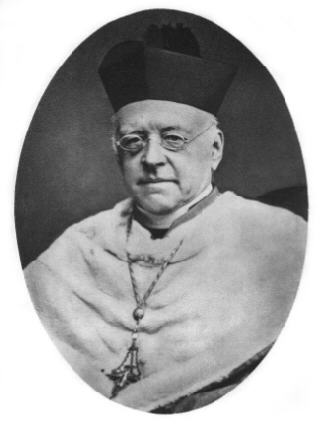
'The Catholic rests not on his own frailty, but on the voice of millions uttering united testimony. He stands with them on the rock of ages, whose foundation is Christ's promise. He hears the winds of persecution howl, and is awakened to vigilance, and wraps his garment of Christianity closer about him. He looks out upon the waters of contradiction, how their waves rise and fall and bellow, crossing in strife, and mingle, and have each their time. He sees each billow, swollen and crested with pride, as it comes and is dashed and broken against the rock, and retires and disappears.' (Bishop W. Bernard Ullathorne).
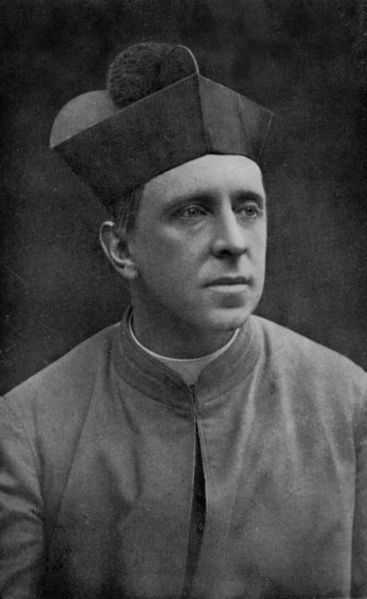
The Miracle of the Church: 'I am the very Vine of God, brought out of Egypt long ago; my seed fell in a ball of fire with the sound of wind; and from that moment I have lived indeed. I thrust my white shoots in the darkness of the catacombs, and forced my way through the cracks of Caesar's falling palaces; my early grapes were trodden under foot, rent by the wild boar in the amphitheatre, spoilt, by little foxes crushed in the wine-press of rack and prison; I am blown upon by every wind that blows, by calumny and criticism from the north, by passion and fury in the south and west. I am pruned year by year with sharp knives forged in death and hell, yet grasped by the hand of the Father who is my husbandman. And yet I live, and shall live, till my Beloved come down to taste the fruits of the garden.' (Msgr. Robert Hugh Benson).
Quotes taken from the book The Consolations of Catholicism (1955).
Courage! Jesus Christ is the Lord of History and the world was created for the sake of the Church, in order to bring Christ's salvation to men (CCC 668/760).
'Pogrom' of Christians in Nigeria
 Torch of The Faith News on Saturday 22 November 2014 - 13:48:34 | by admin
Torch of The Faith News on Saturday 22 November 2014 - 13:48:34 | by admin
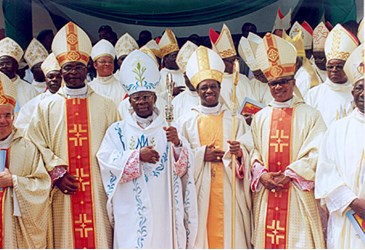
The Catholic Bishops of Nigeria organized an all-night prayer vigil earlier
this month to pray for their nation.
Rorate Caeli has featured Leone Grotti's TEMPIÂ article to highlight the plight of the Church in Nigeria.
The Boko Haram Caliphate is advancing north through the country, murdering Christians and destroying churches in its wake. 2,500 Catholics have been killed, 50 churches destroyed, four convents abandoned and around 100,000 Catholics have had to evacuate their homes. These totals are themselves only a proportion of the 11,213 Christians who have been slaughtered and the 1.56 million people who have been forced to flee. Indeed, Daniel Kadzai, president of the youth section of the Christian Association of Nigeria, contends that the figures may be higher, because they do not include attacks in areas which have been attacked recently.
In just the last few weeks, the towns of Mubi and Chibok fell to the advancing Islamists. This latter is known around the world because of the kidnap of 276 local girls by Boko Haram back in April. According to Fr. Gideon Obasogie, many Nigerian Catholics have been trapped in areas conquered by the Islamists and have been forced to follow strict interpreatations of Sharia law.Â
Earlier this month, the Catholic Bishops of Nigeria gathered together and promoted an all-night vigil to pray for their nation. The vigil included Holy Mass, a Eucharistic Procession, Adoration of the Blessed Sacrament and the recitation of the Rosary. Nigerian Catholics had already been praying for the last 6-months for the safe return of the kidnapped girls.
In light of this report we must ask why Church leaders are not making more of a protest against this mass killing of Catholics and other Christians. Why is there no synod in Rome to deal with this serious problem which threatens the peace and order of the Church and world in our day? We may also wonder why the Western mainstream media continues to look the other way, whilst so many Christians are being systematically wiped out.
Only yesterday Christian Concern highlighted the latest Global Terror Index report. This identified four Islamist groups as bearing responsibility for almost 2/3 of the deaths due to terror attack in the whole world during 2013. Worryingly, these attacks themselves represented a 61% increase on the figures for 2012. As well as Boko Haram, the other groups highlighted in the report included Al Qaeda, the Taliban and Islamic State. The majority of these attacks occured in Iraq, Afghanistan, Nigeria and Pakistan. A young Christian couple were beaten and burned to death in Pakistan a few weeks ago by an angry Muslim mob who accused them of blasphemy. Again, this horrific attack has been largely ignored or overlooked in the Western Church and media.Â
Please pray for these brothers and sisters who strive to keep the Faith in various nations, though being murdered by Islamists, whilst many Church leaders in the decadent West instead spend their days trying to unify the Church with a religiously, morally and ethically relativist society.Â
The Feast of the Presentation of Our Lady at the Temple
 Torch of The Faith News on Friday 21 November 2014 - 13:03:51 | by admin
Torch of The Faith News on Friday 21 November 2014 - 13:03:51 | by admin
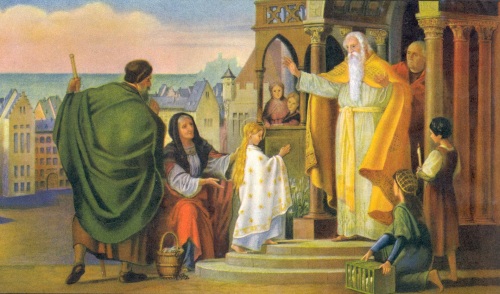
According to an ancient tradition, Our Blessed Lady was presented in the Temple at the age of three. A feast was held to celebrate this occasion in the East from early times. In 1372, Pope Gregory XI approved the celebration of the feast in the West.Â
Collect for the Feast: O God, Who wast pleased that on this day the blessed Mary ever a Virgin, being herself the dwelling-place of the Holy Ghost, should be presented in the Temple; grant, we beseech Thee, that through her intercession we may be found worthy to be presented in the temple of Thy glory.
What do we celebrate on this feast?
Atila S. Guimaraes attended talks given to youth by Professor Plinio Correa de Oliveira between the mid-1960's until 1995. His notes from some of these talks are presented at the Tradition in Action website. What follows is based on those notes.Â
The good professor explained that Our Lady was presented at the Temple so that she could live there as a consecrated virgin, contemplating God.
Before time even began, Our Lady was chosen as the Queen of Jesse from whom the Messiah would be born. As the Temple was the place in the Old Testament where sacrifices were offered to God, it represented at that time the only true religion. Our Lady being received at the Temple was thus the first step in the fulfillment of the promise that the Messiah would come to the true religion. In Her, hope met reality.
When She was received at the Temple, Our Lady entered the service of God. That is to say, a soul incomparably holy entered into God's service. At that moment, notwithstanding the decadence of the nation of Israel, and even though the Temple had been transformed into a den of the Pharisees, the Temple was filled with an incomparable light that was the sanctity of Our Lady.
It was in the Temple atmosphere that, without knowing it, she began to prepare herself to be the Mother of Our Lord Jesus Christ. It was there that she increased her love of God until she formed the ardent desire for the imminent coming of the Messiah. It was there that she asked God the honour to be the servant of His Mother. She did not know that she was the one chosen by God. This is so true that she wondered about the meaning of the salutation of the Archangel Gabriel when he greeted her to ask her permission for the Incarnation. That preparation for Our Lady to be the Mother of Jesus began with the Presentation at the Temple, the feast the Church celebrates on the 21st November each year.
Is there a grace we should ask on this day? We should ask for spiritual help to be better prepared to serve God as Our Lady did. But the best way to serve God is to serve Our Lady herself. So, on this feast day we should re-present ourselves before Our Lady, asking her to receive our offer of service and to give us her assistance in the task of our sanctification, just as the Holy Ghost helped her at the Temple of Jerusalem.
We pray that these words of the good Professor Plinio Correa de Oliveira will encourage and inspire each of us to act accordingly.
We wish you all a blessed feast day. Â
Bernadette Smyth Refuses to Be Silenced - May God Bless Her and Her Family
 Torch of The Faith News on Thursday 20 November 2014 - 16:32:17 | by admin
Torch of The Faith News on Thursday 20 November 2014 - 16:32:17 | by admin

Bernadette Smyth, the inspirational director of Precious Life, refuses to be silenced even though she may face a jail sentence following a court conviction for 'harassment' in Belfast yesterday. Please pray for her and her family at this harrowing time.
Only this morning we received a letter from Precious Life describing the difficult time Bernadette and her family have endured since she was accused of harassing Dawn Purvis, the former politician and director of the Marie Stopes abortion centre in Belfast.
Bernadette explains that the stress and anxiety of 11 months of pressure and persecution have left her wondering how much more she can take. She recalls: 'We have felt harassed, humiliated and let down by the Police service who, on more than thirty occasions, have turned up at my home and work and have treated me like a criminal... My children have had to see their mother on the front of all the daily newpapers and TV reports, with some of the reports going as far as to assassinate my character, and to crown it all, they went as far as to publish my home address. I am sure you can imagine the worry this has caused me.'
Solicitor Aiden Carlin notes that Judge Chris Holmes' decision to convict Bernadette is ''a disappointment to the pro-life movement worldwide.'' He described the court case as a political ploy ''to deter Precious Life and to curtail their rights under Articles 9, 10 and 11 of the European Convention.'' He also pointed out that Bernadette had never used bad language or telephoned Dawn Purvis. Neither had she even made any attempt to make contact with her. Indeed, Carlin stressed that it was Purvis who had approached Bernadette on the two occasions mentioned in the case. He noted too, that Bernadette's work with Precious Life has never led to public disorder and has even been praised by senior police in the past.Â
One of the most remarkable aspects of this case is the fact that abortion remains a crime in Northern Ireland's law and the presence and legal status of a Marie Stopes centre in Belfast has been described as a legal grey area.
Bernadette makes clear in her letter to supporters that the ultimate game-plan is to destroy her reputation and have Precious Life removed from the streets. She has vowed that she will never be silenced while babies in the womb are threatened by abortion. By God's grace, Precious Life aims to persevere with daily prayer vigils at Marie Stopes and the FPA referral centres; giving practical help to mothers in difficult situations; giving pro-life presentations in schools; lobbying at Stormont, Westminster and in Europe; reaching out on the streets via youth4life; and organizing the annual All Ireland Rally for Life.Â
As we've said a couple of times before, Bernadette Smyth has inspired us in the past because of her courageous witness in the defence of the unborn and because she always insists on God being kept at the centre of her work.
In 2003 we accompanied her to pray outside the BPAS abortion centre in Liverpool. Bernadette stood firm when a woman that she offered to help swung a punch at her and when an aggressive biker on a Harley-Davidson motorcycle berated us for praying there. In both of these exchanges, Bernadette firmly stood her ground but was polite and respectful to those who chose to oppose her. She then calmy stated to the group of pro-lifers that such opposition did not really matter as she had her guardian angel with her.Â
Bernadette with the great Cardinal Raymond Burke.
There is a real danger that this court case could be used to try and set a precedent to silence and stop pro-life vigils at abortion centres. Marie Stopes is a powerful organization with an annual revenue of over £145 million. Dawn Purvis, the director of the Belfast Marie Stopes, has a history of campaigning for legalized euthanasia and homosexualist ideology.
Bernadette's solicitors have stated publicly that they will appeal the court conviction, adding that Bernadette and Precious Life have been ''assaulted, insulted and publicly accused for simply defending the rights of mothers and their unborn children to choose life.'
Please keep Bernadette, her family and Precious Life in your prayers. Precious Life would also appreciate any financial support that can be given to support them in this battle in the war for the protection of the unborn.
St. Bernadette of Lourdes - Ora pro nobis!     Â
The Love Born of Faith - 3 of 3
 Torch of The Faith News on Wednesday 19 November 2014 - 12:23:22 | by admin
Torch of The Faith News on Wednesday 19 November 2014 - 12:23:22 | by admin
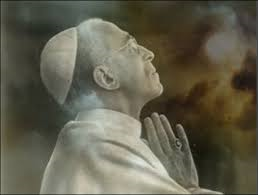
Little Edie was an elderly lady who spoke of Jesus, Our Lady and the saints as intimate friends. Her face lit up like a small child whenever they were mentioned in her presence. She had a rare kind of innocence which made you wish that you had never offended God with a sin in your whole life. Any mention of the devil horrified her. 'Oh, he's horrible!' she would exclaim. Edie looked forward to her Holy Communions with expectation and wonder. The Rosary was never far from her hand.
None of this must make us think that Edie lived in a kind of protected sanctuary. She endured painful ulcers on her legs for many years which kept her bed-bound and cut off from others. These ulcers resisted all medical remedies and emitted an unpleasant odour. They had forced her to remain house-bound in the living room of her small terraced house. Eventually she had to lose even this and move into a nursing home. However, she did not grumble. Her hallmarks were peace, love and a gentle joy which pointed one to Christ. What did trouble her was sin and atheism. When a lady in the nursing home died, days after stating that she did not believe in God, Edie was deeply troubled for the woman's soul.
As a young woman Edie had made a pilgrimage to Rome. Whilst there, she had seen and listened to Pope Pius XII. The reverence and happiness with which she described His Holiness was memorable. It bespoke a time when even popes were in awe of their office.
In 1997, I travelled to Lourdes to work as a brancardier. Edie was also in the convoy of vehicles as a patient. At a motorway service-station I boarded the 'Jumbulance' to check on Edie. Even though the long journey, by road and rail across two countries, was harrowing in her condition, Edie's face lit up when she spoke of the pilgrimage as a fulfillment of a long desire to visit Our Lady of Lourdes. The blessed memories of her visit to the Grotto of Lourdes sustained her for a long time after her return home.
One day in her nursing home, Edie told me that Our Lady had made the Sun spin in the sky for her. Rationalists would likely scoff, but had you met Edie it would seem almost normal for Our Lady to whirl the Sun like a child's spinning-top for such a devoted little one.
That was because entering the presence of Edie gave one a tangible sense of the proximity of Heaven. How wonderful such Catholics were!
We've mentioned Dick Edwards before, but it does no harm to remember such saintly souls. Â
Dick was a gentleman who lived into his early nineties. He befriended Dad several years earlier during Dad's search for the One True Faith. Dick used to attend Benediction and Stations of the Cross every Friday night of the year in the local parish. On the way he would meet Dad, give him a handful of toffees and walk with him to the Church.
Even on very stormy nights, Dick would turn up on time at the usual meeting point in his immaculate suit, tie and polished shoes. One night Dad suggested that this was an impressive achievement for a man of Dick's advancing years.
Dick's reply stayed with Dad and played a big part in his own journey into the Faith. Although it took many more years to hit home with me, it is an answer which I have never forgotten either.
Dick acknowledged that there were indeed many nights when he felt tired or cosily warm by the hearth. And true, he did not much feel like venturing out into the darkness, wind and rain of a cold winter night. But then he used to think on what it had cost Our Blessed Lord to go to Calvary and die on the Cross out of love for him and for his eternal salvation. Dick explained that this thought motivated him to make an act of love back to Jesus in gratitude for His love, grace and mercy.
Modernists, who wish to play down the existence of serious sin, deny the sinfulness of homosexual activity and contraception, or deny the indissolubility of marriage, overlook the words of Our Lord in Matthew 16:24-26, where Jesus gives the imperative to all who would follow Him to take up their Cross each day. The witness of people like Dick reminds us to return some love for such unmeasurable love.
In common with the other lay Catholics that we have considered this week, Dick drew his strength from Holy Mass, shared devotions, personal prayer and outreach to others. The lives and faith of these people were so fruitful because they accepted and received the Church as She is in Her nature. They did not try to reinvent the Church to suit their own ends, to give them power or to become popular with the world. Rather they lived from her sacraments and the many other means the Catholic Church gives us to reach our Heavenly home. This is the very essence of humility.
Years ago, one would likely meet many souls like these; Catholics who had received a good foundation and formation in their home, parish and school. They were well equipped for the pilgrimage and the spiritual warfare which constitute this earthly life. They emanated holiness and virtue. The sheep then did not reek of the world but were imbued with the fragrance of Christ. This was a mystery which drew people to the Church and to the salvation and sanctification Christ gives through Her. People like my family, who came in to the Church from the outside, can tell the difference a mile off between this authentic Catholic spirituality and attempts to impose a worldly bureaucracy on the Church. This is too frequently being done to facilitate dissent, the acceptance of sin and worldliness. The attempts by Modernist prelates, priests and lay intelligentia, to bring the Church into line with the mores of an atheistic and secularist society are evangelizing no-one.
If the Church is to persist and flourish in the West, then we need to become what we already are, rather than continually try to reinvent the wheel with the latest novelty. It will start if each one of us asks God to convert our own hearts. It will continue through the restoration of the Sacred Liturgy, Orthodox Catechesis, authentically Christocentric-Trinitarian prayer and a truly Christian communal life; which neither compromises with sin, nor pushes away sinners. We must accept Christ as He already truly is - the King of our hearts, our Church and our world.Â
May God give us the grace to do so.
The Love Born of Faith - 2 of 3
 Torch of The Faith News on Tuesday 18 November 2014 - 13:05:40 | by admin
Torch of The Faith News on Tuesday 18 November 2014 - 13:05:40 | by admin
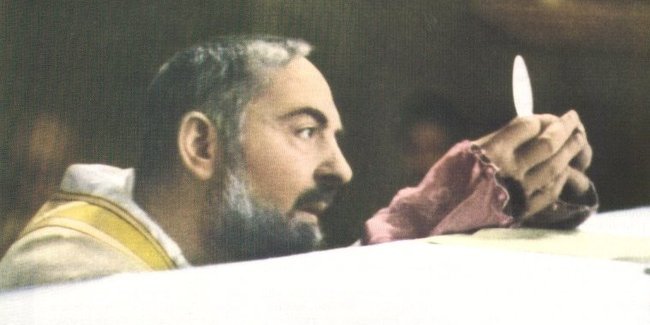
Another lady who welcomed me at my reception into the Catholic Church was also named in honour of Our Lady. At that time, she was a joyful, young wife and mother who attended Mass and traditional devotions, like Benediction, Novenas and Stations of the Cross, each week in the parish. Her faithful reception of the sacraments flowed out into service in the parish and public acts of pro-life witness.
A few years later she too received the shocking diagnosis of cancer. The heaviness of this Cross can be glimpsed by considering the youth of her husband and children, together with the hardships of her chemotherapy. Nevertheless, with God's grace and the love of her family, it was a heavy Cross which she did indeed carry.
During those painful months, she gave me a little image of St. Martin de Porres and a beautiful wooden crucifix. This was especially poignant. Around this time we encountered her on a pilgrimage. She passed us by and we witnessed her speaking in a very natural and unaffected way to a framed photograph of St. Padre Pio. Looking back, it seems that she had already begun to live more in the next world than in this. Please, do not mistake this for some kind of escapism. This lady went right through her grim sufferings, helping her family practically and forgiving her enemies as she struggled on.
A priest told us - in hushed tones of awe - Â that in the last days of her sufferings, a nurse had been washing our friend's feet for her. The nurse had suddenly exclaimed that she thought she had been washing the feet of Christ when, looking down, she had seen the nails.
The recollection of such mysterious happenings can aid our faith and encourage us. We seem to glimpse in them the intimacy which Jesus grants to those who embrace their crosses and join them to His, accepting His will even when they seem to be losing everything. And such union with Christ draws souls. When this lady went home to God, her house was full for the final Rosary, and the Church was packed for her funeral. It was the first Catholic funeral I had ever attended and I was struck in a new way by the words 'In Baptism she died with Christ, may she now rise with Him to new life.'
One only has to look at this lady to see the love of Christ shining out!
Mrs. Campbell was a Catholic mother and grandmother who attended Mass every day at the Blessed Sacrament Shrine in the city-centre of Liverpool. During her life she had given birth to 12 children and had travelled to serve in Lourdes for 34 consecutive years. One of her grandsons became a Catholic priest.
In the late 1980's Dad was searching for the Truth and he began to attend the Shrine to pray and discern. Mrs. Campbell spotted him as a newcomer, befriended him and took him under her maternal wing. She began to reserve a seat for him at the daily lunch-time Mass.
It was not professional-looking meetings, lay leadership, liberal theologians or 'new models of being church' which attracted Dad to Catholicism. Rather, it was truth, beauty, holiness, reverence, Our Lady, the Real Presence and the Holy Sacrifice of the Mass. All of these mysteries were made accessible to him by little people like Mrs. Campbell, who, though well grounded in the heart of the city, shone with the light of Christ. In them one could glimpse the Church as both a human and divine institution.
When Mrs. Campbell passed from this life in 1992, Dad wrote a letter of tribute to the Catholic Pictorial. He explained: 'As a tribute to her and in remembrance of her life, I would like to say that it was because of her influence, her reverence, her love of God, of our Lord Jesus Christ, His Holy Mother and of the Mass and through her prayers that I became a Catholic.'
Matthew 25:35 announces: 'I was a stranger and you welcomed me.' In these times, when Modernists are pushing 'Gradualism' and pastoral programmes become ever more bureaucratic, we do well to reflect that it is the welcoming of sinners by ordinary but holy people, and never the welcoming of sin, which will attract people and lead them home to Christ and Salvation in His Church.   Â
The Love Born of Faith - 1 of 3
 Torch of The Faith News on Monday 17 November 2014 - 12:31:54 | by admin
Torch of The Faith News on Monday 17 November 2014 - 12:31:54 | by admin
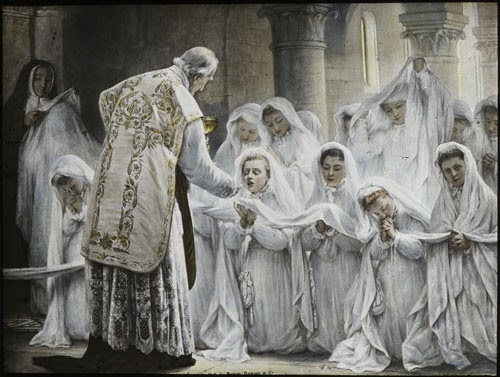
''There can be people who are engaged uninterruptedly in the activities of Church associations and yet are not Christians. There can be people who simply live by word and sacrament alone and practice the love born of faith without ever having attended Church groups, without ever having concerned themselves with the novelties of ecclesiastical politics, without having taken part in synods and voted in them - and yet are Christians. We need, not a more human, but a more divine Church; then she will also become truly human'': Called to Communion - Understanding the Church Today by (then) Cardinal Joseph Ratzinger.
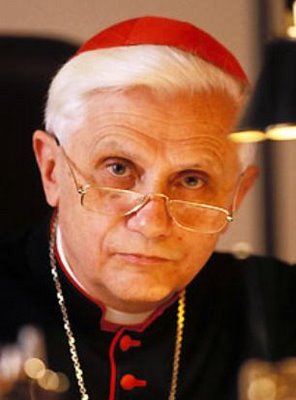
As dissent, theological confusion and loss of faith become more widespread, many dioceses have attempted to react by moving from the divinely inspired structure and mission of the Church in search of new ways of 'being church.' Indeed, this trend is both a source and symptom of the spreading apostasy that typifies our times. Such diocesan and parish programmes generally end with increasing levels of bureaucracy and efforts to laicize the clergy whilst clericalizing the laity. In all of this local churches become more insular and inward looking. Liturgy focuses more on us than God; catechesis collapses into personal sharing of subjective 'religious' experiences; Trinitarian prayer dissolves into vague syncretism; and any community outreach that continues lowers its horizon from the salvation of souls to purely humanitarian concerns. Thus, in gradual and often subtle stages, whole communities of the faithful move beyond Christ.Â
To counter this tendency, whilst encouraging, edifying and exhorting our readers to holiness, we wish to provide a few brief accounts of remarkable lay Catholics that we have known. In many ways these were people like you and me. They lived 'ordinary' lives in workaday settings and experienced a varied mixture of love, joy, hardship and suffering. What set these folks apart was the fact that they co-operated with grace to a high degree in order to live the kind of love born of faith which (then) Cardinal Ratzinger described so well above. These people were not involved in 'remodelling' the structures or mission of the Church. Any 'change' which they sought in the Church was more to do with the conversion of their own souls. In many ways theirs was a simple faith, but to see them was to glimpse Christ. Though disparate in their ages and social backgrounds, what they each had in common was a deep prayer life, which was nourished by the sacraments, and an acceptance of the doctrines of the Church. These elements gave shape to their lives and over time led to a tranquil acceptance of God's Will; even when that was mysterious and painful for them. How much the Church needs such lights in our times.Â
Today we will begin with Mary.
Some souls are so self-forgetful that you do not realize that they were saints until some time after their passing. This is how it was with Mary. A nurse by vocation and profession, her care for others emanated from a deep interior life in Jesus Christ and Our Lady. I only know of this from a letter she once wrote to me in a time of upheaval in my life and from some extremely prophetic words that she spoke on the night I became a Catholic. In both these instances, the depth of her spirituality and truth of her words has only struck home many years later.
Mary had a deep tranquility of soul. She was truly Christ-like. And in common with the Master, she was much misunderstood and misrepresented in her lifetime. And also like Him, she never complained of her lot.Â
Even when her husband stopped going to Mass and walked out on the family home, she embraced the Cross and offered it up for him. Mary began attending an extra Mass each weekend to try and fulfill his obligation for him. Truly vicarious suffering. Her quiet witness has much to teach in an age when the permanence of marriage is under such diabolical attack.
This good lady also once suffered an attack on another symbol of family life, when she endured a serious break-in to her home. The criminals ransacked everything. Her response was to simply tell people not to worry for her safety as she knew that Our Lady was looking after her.
At Mass Mary was deeply reverent. It was a reverence that flowed out into her loving care for others. The main recipients of her care included her patients at work, housebound parishioners and elderly priests. She dedicated a lot of her free time to ferrying the elderly in her car and fetching shopping and other errands for them.
A decade after meeting Mary, she was diagnosed with Cancer in her early 60's. Although suffering, she dedicated some of her final time on this earth to teaching the Rosary to little children. And then she faded gently from us.
When one thinks of Mary today, one thinks of Our Lady and of Jesus. Hers was the love born of faith. This is what attracts others to Christ and His Church. What a legacy. May she rest in peace. Â
Let us Turn to St. Thomas More
 Torch of The Faith News on Sunday 16 November 2014 - 12:43:35 | by admin
Torch of The Faith News on Sunday 16 November 2014 - 12:43:35 | by admin
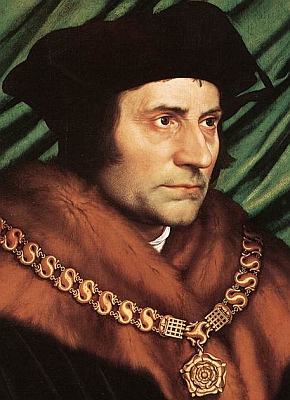
G.K. Chesterton wrote that St. Thomas More was becoming more important than at any moment since his martyrdom. He added that More's importance would increase further around a century later. As with so many other themes, time has proved the accuracy of Chesterton's foresight.
Closer to our own time, in 1961 to be exact, Fr. Germain Marc'hadour, one of the most widely respected scholars of St. Thomas More, wrote a similarly insightful article. There follows an extract which readers may find helpful today:-
'It may be that the near future will face all of us with the problem of harmonizing, or simply reconciling, our loyalty to Ceasar with our loyalty to God... Ceasar, moreover, is no longer a monarch; he is a cabinet, or a party... he is public opinion, which shapes - and is shaped by - the newspapers, the broadcasts, the schools...
If we may bring a few examples, there are today fields of conduct, such as divorce, sexual behaviour and education, the use of artificial contraceptives, abortion, mercy-killing, nationalization, film censorship, and a few more, in which a Catholic, especially if he is a lawyer, a doctor, a nurse, or a teacher, will find himself alone against practically everyone else in his profession...
As in penal days, the Catholic will sometimes be alone of his species in the whole street... He will even find fellow Catholics ready to taunt him... In extreme cases fidelity to the doctrine of Mother Church will mean worse than corporal death: it will alienate from a man the trust and esteem of the people he likes, or even loves, best... The prospect of this social disqualification, of this civic annihiliation so to speak, is as strong and effective a pressure as the old forms of physical duress... thousands will apostasize simply because they see no rational justification for the Church's position on a number of points, and they have not enough faith, on the other hand, to cling to Her through sheer obedience...
... If ever we lack wisdom to decide where the golden measure of Christian obedience lies, or grace and energy to carry out its implications when we are bleakly isolated in a hostile environment, let us turn to St. Thomas More. The obedience of one man redeems the sins of many. The fervent intercession of one saint can remedy the sickly reluctance of many tepid Christians. He is a dangerous patron and a dangerous friend, ''a nuisance of a saint,'' who never believed in being carried to Heaven on a featherbed. He will not teach us an easy way, but he will show us where we can find the comfort we need to suffer our freely accepted discomforts.'
We hope these words provide encouragement to our readers as we each join in the weekly celebration of Christ's Resurrection on this Sunday. St. Thomas More - Pray for us!Â
''Error Refutes Itself'': St. Irenaeus of Lyons, Adversus Haereses
 Torch of The Faith News on Friday 14 November 2014 - 17:55:01 | by admin
Torch of The Faith News on Friday 14 November 2014 - 17:55:01 | by admin
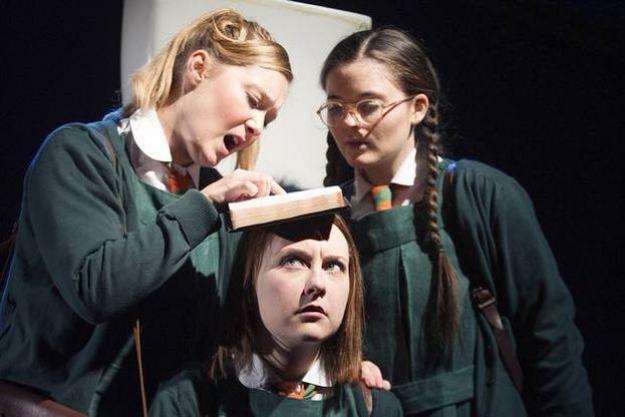
Several months ago, we highlighted the fact that the 6th-Form arts department of a Catholic high school on Merseyside had attended the stage production 'Once a Catholic' at the Royal Court Theatre. At the time, we wrote to complain to the headteacher and invited our readers to do the same.
Just to recap, we were complaining because the advertising materials for this play included a blasphemous portrayal of Our Blessed Lord with a 'Rockabilly' hairstyle. The play itself also included much sacrilegious content, including :-
Mockery of Jesus on a Crucifix.
Mockery of His Miracles.
Mockery of Our Lady of Fatima.
Mockery of the Sacred Priesthood.
Mockery of Female Religious.
Mockery of the Virtue of Purity.
Portrayal of the Catholic Church as a sadistic and unforgiving institution.
Sadly, the response of the headteacher to our complaint only serves as further evidence of the dire state of 'Catholic' education. Whilst there are of course some good individual Catholic teachers, the general system, the curriculum and a great many of the staff only serve to further the corrosion of Catholic education in this country. This is because they do not express themselves as Catholics but as dyed-in-the-wool post-moderns.Â
The headteacher's reply to us gives much evidence of this. It begins by raising a 'technical point'; we are informed that the head would not normally respond to a complaint such as ours, because we 'did not raise a question' to be answered. This need for questions rather than objective statements typifies the post-modern. After all, a written complaint is a written complaint. Can it really be suggested that a set of objections to a blasphemous drama requires a question to merit a response? And this from the head of a Catholic school?
In any case, at least the headteacher did take the time to reply to us. Immediately after pointing out this 'technical point' he himself makes a statement - not a question notice - which seeks to relativize our complaint. We are informed: 'It is clear that you have very strong views about this Play, and its themes.' This is another typical example of post-modernist expression. The problem will not be permitted to be objective. No, it must reside within us and our 'views'. There will be no acceptance that the 'Play' could be blasphemous or wrong in itself, but only that we might view it as such. The post-modern claims to see all things only as a matter of perspective. At least, when it suits them so to do...
But as St. Irenaeus said over 1,800 years ago: 'Error refutes itself.' The post-modern cannot keep up this game of illusions in the hall of mirrors. In the final analysis, some things must be objective and these things usually end up being the 'views' of the post-modernist.
The headteacher gives evidence of this in his attempt to 'refute' our 'negative comments' about the school's mission statement. Actually, we did not make negative comments about the mission statement, but suggested that taking students to see such a blasphemous play would be a failure to live out the values expressed therein.
Part of the evidence the headteacher musters in his refutation is the fact that the school takes part in fund-raising for various charities. Now, it must be said that some of these are worthy. The school supports religious sisters working in Nigeria and the local Marie Curie Hospice. However, the examples of CAFOD, Children in Need and Oxfam are more troublesome.
Catholics in England will already be well versed in the moral issues relating to CAFOD and we have written about them several times before. SPUC have highlighted the fact that Oxfam has funded workers at a clinic run by the abortion provider Marie Stopes International and has also provided grants to two organizations in Ethiopia and Yemen which are affiliated to IPPF, the world's biggest abortion provider. Children in Need meanwhile have made grants during 2012 and 2013 to sexual health centres and projects to support homosexual youth. As SPUC point out, such centres often support or even facilitate abortion, abortifacients and damaging forms of sex education. And we are not talking trifling sums here; Children in Need gave £30,803 to the Terence Higgins Trust, which has endorsed the 'right to choose abortion,' promoted morning-after-pills, produced highly explicit sex education materials and produced pro-euthanasia advanced directives.
In our complaint to the school, we pointed out that it would be unlikely that the school would attend a drama which mocked any other religion or cultural group. Not only was this part of our communication overlooked, but the headteacher gave us the expected lecture about the school being committed to respecting and embracing diversity.
Such a mantra today is so typical that it often bypasses deeper reflection. It is often the knee-jerk response to those complaining about attacks on the Catholic Church. In the new world of tolerance there is only one acceptable prejudice. Such responses are also typically post-modern. We must ask in what way are true respect and diversity honoured by blasphemy, mockery or impurity?
The headteacher next suggests that pupils returned from the theatre with a greater understanding of other people's views of the Catholic Faith in the era in which it was set, and that it did not affect their 'views' of their own faith, 'other than to reaffirm it.' Clearly, such responses remain subjective. The head has still not engaged with the objective problems of blasphemy and sacrilegious mockery. It must also be noted that any reaffirmation of one's Catholic Faith would of necessity be made as an act of resistance to such a play, rather than as a fruit of it.
The head continues to dwell in the realm of the subjective by next stating that he does not share our 'views' that taking students to such a play contradicts the school's Mission Statement. The relativistic conception of reality continues with the statement: 'I respect your opinion on this matter which you are entitled to express.' Suffice it to say that it is only because our society grew from a combination of ancient Greek philosophical and Catholic theological roots that the very notion of freedom of expression developed at all. Of course, before the advent of post-modernism, such freedom was associated with the pursuit of objective truth rather than the descent into subjective relativism.
The headteacher concludes by attaching some school newsletters in the hope that 'the content forms in you the belief that as a school we, as Liverpool Archdiocese section 48 RE inspection confirms provide an environment where 'the extent to which pupils contribute to and benefit from the Catholic Life of the school is outstanding.' One must ask why the Archdiocese does not itself deem such a theatre trip inappropriate. And why is the headteacher's reply able to acknowledge the objective criteria of a school inspection standard but not the standard given by God in the Decalogue? Â
Here we do indeed have an interesting combination of the subjective and the objective. It is hoped that 'belief' will be 'formed' in us that the school provides the type of environment described by the Archdiocesan inspection standard.
It must be said that, cheery though the newsletters were in tone and imagery, there was little in terms of objectively Catholic doctrine, liturgy or art to convince us of anything other than what we already had gathered from the head's communique. Neither did the inclusion of photos of the sand-box in the 'interactive prayer room', the female 'lay chaplain' or the religious sister in lay-clothes form any new beliefs in us. And we are thankful that they did not.
It is remarkably sad that a Catholic school would take students to see a play which blasphemes Jesus Christ and Our Lady at the same time as mocking the Catholic Church and Catholics themselves. As a reader pointed out some time ago, the students themselves as baptized Catholics - and therefore as members of the Body of Christ - are being insulted by such a dramatization.
It is also sad that the head of such a school would fail to acknowledge the objective problems with such a play and the attendance of the school at it.
Even more sad is the attempt by such a headteacher to reduce such problems to the realm of the subjective.
Nevertheless, it also serves as another example of truth coming to the fore. Relativistic responses convince no-one and the objective problems remain. In fact, they are only thrown into sharper relief. It is as St. Ireneaus recognised all those centuries ago: Error refutes itself.     Â











